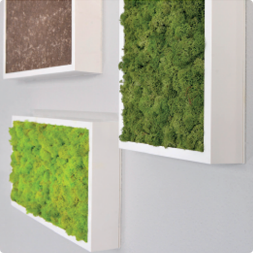Do Plants Create a Healthier Lifestyle?
For as long as history seems to remember, plants have been used for decorations in just about any and all locations. Churches, homes, retail locations, offices, all seem to have house plants – even factories in some instances have displayed indoor plants. As we know, these plants have decorative value but many of us are not aware of the numerous health benefits that come with their presence as well. This article is meant to remind you of these benefits and reinforce their significance in the plant community.
Mental Health
With rising media and social coverage of mental issues as well as a deeper scientific understanding of mental health, this topic has become a mainstream day-to-day discussion in the workplace and throughout general society. All walks of life from kids to adults, regular people to pro athletes, and everyone in between are all changing portions of their lives to account for the mental health effects of certain daily life struggles. Retailers are adjusting their interior designs to make consumers subconsciously feel better in their stores while offices are doing the same, relying heavily on creating productive and zen spaces. Many of these changes have come through plants, which are no longer simply being looked at by professionals as decorations or corner fillers.
Plants help you avoid the feeling of isolation, which occurs all too often for most of us who sit inside doing what most of us do for a majority of our lives – work. As a result, you are seeing plants being placed in offices, homes, and other areas to keep people feeling connected more naturally to the world around them while completing their daily tasks. This is also known as Biophilic Design and as it becomes more common we are seeing more plants in the workplace.
“We all need to play in the dirt to stay healthy”
Studies have shown gardening to be proven to boost one’s mood, despite the hard work it involves. The plant itself has its benefits however the soil has been proven to be equally as beneficial (or more) as it has similar effects to one’s brain as antidepressants. Gardening is hard to accomplish when you might not have the means or property to do so, so indoor plants are a way to do that and can be done in any space and home, apartment, condo, or house.
Researchers have found that a “good bacteria” commonly found in the soil will activate brain cells to produce the brain chemical serotonin, which alters one’s behaviors and thoughts similar to antidepressants. Within the body, serotonin constricts blood vessels, sends messages between cells in the brain and within the central nervous system, regulates the secretion of digestive juices, and helps to control the passage of food through the gut. Serotonin has positive effects throughout the body in different ways, however, portions of the brain where the mood is regulated see the need for high levels of serotonin. Antidepressants work by increasing serotonin levels in the brain. Low levels of serotonin have been linked to several disorders such as anxiety, depression, obsessive-compulsive disorder, bipolar disorder, aggression, irritable bowels, and fibromyalgia. The brain and body have many ways of working to maintain high levels, one of which is absorbing it, or “reuptake”, which comes into mind during the process of interacting with plants.
The more you inhale and have physical contact with plants and soil, the more positive effects you will experience. These effects have been studied to the extent that many scientists encourage the general populous to “spend more time playing in the dirt”. We encourage you to place your house plants in places close enough for you to absorb this type of energy on a regular basis, hence workspaces, bedrooms, kitchens, and living rooms.
Responsibility
We all need things to keep us grounded, in line, and on schedule. Without responsibilities, we would be bored, lazy, unproductive, and unhealthy. Caring for a living thing will encourage you to stay on schedule with your care of the plant and attention given to the plant. This periodic scheduling will create disciplines that will spill into other parts of your life making you more effect of a human being and a better person mentally.
Air Quality
We have a global population of 8 billion people, which is growing drastically every day. Because of these numbers and substantial development in recent decades, we forget that we really do need growing life forms other than us to sustain our way of life. We need a balance, and plants provide that balance a little cost than some minor care and cost. Humans breathe in oxygen and breathe out carbon dioxide, which is toxic to humans. Plants do the opposite as they uptake carbon dioxide and produce oxygen, how neat is that?! This balance in nature is needed globally and in your home. When you have a plant at home, your home’s air is healthier and better for you and your family. A higher oxygen level will mean a more effective and healthy body – which is why you see people with health or breathing issues being provided with oxygen tanks. A boost in oxygen will decrease fatigue and increase mental function through a release of positive hormones in your body. Some plants are better than others at cleaning out air pollutants and increasing air quality. One of our current favorites is the Sansevieria or the Snake Plant. A low-maintenance plant, almost no-care that increases your air quality.
Additionally – people often do not realize the air inside a building or home is often worse than the air in the middle of a major city. The reason for this is pollutants can get in easily, but often stay circulated in HVAC systems and have difficulty escaping. Plants will improve this air quality by fighting the air pollutants and balancing the presence of pollutants in the air. Research has shown that up to 87% of pollutants present in the air can be removed by plants. Many of these pollutants are very harmful chemicals such as formaldehyde and benzene, which are known to cause cancer.
Immune System
The air quality and mental health benefits also spill over into the immune system. Chest and lung issues, for example, can arise from irritations caused by air pollutants. Secondarily, humidity levels will be balanced. Dry air will also cause lung irritation and other problems such as overheating or dry mouth. Adding moisture to the air through the presence of plants will mitigate this issue and may help you avoid costly items such as humidifiers.
Fresher air with fewer pollutants will lower this irritation level. The byproducts of plants’ metabolism will reduce stress, which can improve a person’s immune system. Most of the time you will not feel these effects, but you will notice them when you have not been sick in months and have not caught the flu bug going around. Studies have even shown a large percentage drop in illnesses between homes that have plants and those that do not.
Fortunately, there are many different options to fit people’s lifestyles and workplaces. Restricted space sizes, types, and looks can all be fitted with any of the thousands of options of plants. Not all plants in existence are known to scientists, but 391,000 are – plenty of options to fit where we need them to. Lifestyles will vary as well. Some people do not have time or the ability to water a plant daily. If that is the case that is not a problem, there are plenty of popular plants such as a cactus that can survive on periodic watering. With this flexibility, it is time for people to make a beneficial investment in plants as their presence alone pays dividends.



















